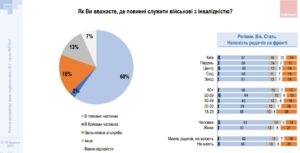Only 2% of Ukrainians support the opinion that defenders who have been disabled can continue to serve in combat units. Another 60% of respondents indicated that such fighters should serve in the rear.
This is evidenced by the data of a sociological survey of the Rating group, conducted on the initiative of the Ukrainian Veterans Foundation of the Ministry of Veterans Affairs of Ukraine in March. The UVF investigated the level of discrimination in society against different categories of defenders.
“Servicemen with disabilities can be responsible for themselves. If a soldier’s health does not allow him to perform certain types of duties, for example, to enter the enemy’s rear 20 km deep, nevertheless these people have the most valuable thing in the army – experience. In the combat unit, a person with this experience can perfectly occupy a sergeant, instructor or managerial position. Their experience will help to train and prepare new people, to show by their own example that everything is possible. These people should not be deprived of the opportunity to serve the country, because this is wrong. If a person with a disability wants to continue his service, his experience must remain in the army. The service algorithm of such soldiers should not be a “call-to-call contract”, but it should have the possibility to retire when the soldier himself decides. And no one should condemn them,” says Roman Kulesha, a soldier of the Ukrainian Armed Forces, a veteran, and a mobilized worker of the Ukrainian Veterans Foundation.

At the same time, people aged 18-29 feel the most sadness when they think about people with disabilities serving in the army, 39% of the respondents experience that. Guilt towards defenders is also more often felt by young people, 7% for the 18-29 and 30-39 age groups. In general, in these two age groups, only 3% of surveyed Ukrainians feel indifference towards these people.
More details on other research categories are available at the link.
Survey dates: March 27-29, 2023. Sample population: 2,000 respondents. Survey method: CATI. The error of representativeness of the study with a confidence probability of 0.95: is not more than 2.2%.


